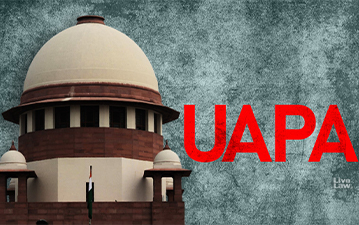
Understanding The Unlawful Activity Prevention Act and Bail Provisions
The Unlawful Activities Prevention Act (UAPA) stands as a cornerstone in the legal arsenal of many nations, aimed at combating terrorism and safeguarding national security. Enacted with the intent of thwarting unlawful activities and disrupting the networks that propagate them, the UAPA empowers law enforcement agencies with robust mechanisms to investigate, prevent, and prosecute acts deemed detrimental to the sovereignty and integrity of the nation. Since its inception, the act has undergone several amendments, reflecting evolving threats and judicial interpretations, making it a subject of intense scrutiny and debate within legal, political, and human rights circles. This introduction provides a glimpse into the multifaceted nature of the UAPA, delving into its origins, provisions, controversies, and implications for civil liberties and national security.
Notable characteristics of the UAPA:
Unlawful actions, as defined by the Act, refer to any deliberate action undertaken by an individual or group to undermine the territorial integrity and sovereignty of India. It includes verbal communication, written expression, or behaviours that endorse the act of seceding or ceding any portion of India.
Terrorist Activities: The UAPA offers a comprehensive definition of terrorism, encompassing actions that pose a threat to India's unity, integrity, security, or sovereignty, and aim to instill fear in the population or specific groups within India or any foreign nation. It includes actions of aggression, vandalism, and utilisation of firearms or explosives.
The 2019 amendment to the Unlawful Activities Prevention Act (UAPA) marked a significant turning point in India's legislative approach to counterterrorism and national security. Introduced with the aim of enhancing the effectiveness of law enforcement agencies in combating terrorism, the amendment expanded the scope of the UAPA by empowering the government to designate individuals as "terrorists" based on certain criteria. This amendment also granted authorities the authority to seize properties owned by suspected terrorists, further bolstering the state's ability to disrupt terrorist financing networks. However, critics raised concerns about the potential for misuse of these expanded powers, particularly in terms of infringing upon civil liberties and fundamental rights. The 2019 amendment to the UAPA thus represents a contentious and complex intersection between the imperatives of national security and the protection of individual freedoms in a democratic society.
The Act confers broad investigative powers onto the National Investigation Agency (NIA) to probe and bring legal action against offences under UAPA. It permits searches and arrests without the need for a warrant, based on suspicion of being involved in actions related to terrorism.
Under the Unlawful Activities (Prevention) Act (UAPA), bail procedures are quite stringent due to the seriousness of the offenses covered. Additionally, the burden of proof often rests heavily on the defendant to demonstrate why bail should be granted, and the courts tend to prioritize national security concerns when evaluating bail applications under UAPA.
Bail- Restrictions In Section 43D (5) of UAPA Act Are Stringent:
In the aftermath of the Bombay terror attacks, the Union government enacted the UAPA Amendment Act, 2008. The Amendment introduced Section 43D (5), which required a Court to deny bail if there were reasonable grounds to believe that the case against the accused was prima facie true. The provision made bail difficult to secure, since it required the Court to assess guilt only by looking at the charge sheet prepared by the National Investigation Agency (NIA). The accused cannot provide any evidence outside the chargesheet in their defense.
Special Courts: The legislation allows for the creation of specialised judicial bodies that have the authority to hold closed-door trials and handle evidence in a manner that preserves the anonymity of witnesses and protects sensitive information.
Disputes and Evaluations:
Issues related to the protection and promotion of human rights:Critics contend that the UAPA's expansive definitions and rigorous provisions have the potential to be abused by authorities, leading to infringements on human rights and civil freedoms. The prolonged incarceration without formal charges and the challenges in securing release on bond have been sources of disagreement.
Political Misuse: There are apprehensions that the UAPA can be exploited to target political adversaries, activists, and journalists by falsely claiming to prevent terrorism, thus suppressing opposition and curbing freedom of speech.
Judicial Scrutiny: Although the courts have validated the Act, there have been demands for increased judicial supervision to prevent misuse and guarantee the protection of the accused's rights.
Navigating the Legal Maze: My Journey in Handling a UAPA Case
Recently, I secured Bail for my Client Vaibhav Raut who was arrested in Nalasopara Arms Hauls case as the Pßrime accused on charges of being a member of Right wing group Sanatan Sanstha and plotting an attack on the Sunburn Festival with crude bombs. Vaibhav Raut was arrested on August 9, 2018, after the Maharashtra Anti Terrorism Squad seized a significant amount of ammunition, including country-made pistols and crude bombs from his home in Mumbai’s Nalasopara locality.
I read the entire chargesheet filed against my Client Vaibhav Raut. According to the prosecution, Vaibhav Raut is a part of a conspiracy to destabilize India and destroy the sovereignty and integrity of India by indulging in some terrorist activity. Raut is allegedly said to be an active member of an organization (Sanatan Sanstha) of which the other co-accused are also alleged to be members. The object of this organization is stated to form a ‘Hindu Rashtra’, by secretly forming a terrorist gang within the State of Maharashtra and adjoining states. It is further alleged by the prosecution that in order to achieve the said object of the Sanatan Sanstha, Raut prepared crude bombs and stored explosives in his house and in the godown. It is further alleged that Raut also conducted recce of the places where the bombs were to be planted. It is further alleged that one of the aims of the members of the Sanatan Sanstha was to prevent screening of movies, holding of western cultural programmes and organisation of such events, such as the ‘Sunburn’ festival in Pune and other events, which according to Sanatan Sanstha are perceived to be against the tenets of Hinduism, an ideology followed by the Sanatan Sanstha.
I argued before the Bombay High Court that although, there is recovery of 8 crude bombs from the house of Raut, the said house does not stand in the name of Vaibhav Raut, nor are the bombs recovered under section 27 of the Indian Evidence Act. I further argued that even the godown from where 12 crude bombs are recovered, does not stand in the name of Raut but stands in the name of Om Sai Developers and that here is no documents on record to show that Raut had purchased the said godown. Moreover, the alleged Bomb were seized prior to the arrest of my Client. I submitted that the alleged diary which is in the handwriting of Raut was recovered from the garage, However, the contents therein, have not been corroborated by any witness. I further asserted that the godown from which the crude bombs were retrieved belonged to a different owner and not my client. the said recovery from the godown is also not under section 27 of the Indian Evidence Act, but, was effected prior to the arrest of Vaibhav Raut.
I emphasized that the presence of statutory restrictions like Section 43-D(5) of UAPA per-se does not oust the ability of Constitutional Courts to grant bail on grounds of violation of Part III of the Constitution. Indeed, both the restrictions under a Statue as well as the powers exercisable under Constitutional Jurisdiction can be well harmonised. Whereas at commencement of proceedings, Courts are expected to appreciate the legislative policy against grant of bail but the rigours of such provisions will melt down where there is no likelihood of trial being completed within a reasonable time and the period of incarceration already undergone has exceeded a substantial part of the prescribed sentence. Such an approach would safeguard against the possibility of provisions like Section 43-D(5) of UAPA being used as the sole metric for denial of bail or for wholesale breach of constitutional right to speedy trial.
Resultantly, Bombay High Court granted Bail to Vaibhav Raut on September 20, 2023.
Thorough research and a deep understanding of the intricacies of the Unlawful Activities Prevention Act (UAPA) was pivotal in helping me secure bail for my client facing charges under this stringent law. The UAPA is known for its stringent provisions, including provisions regarding bail, which require a meticulous understanding of both the legal framework and the specific circumstances of the case. I embarked on a comprehensive examination of the UAPA, dissecting its provisions and legal precedents to identify any potential avenues for bail within its constraints. This involved scrutinizing the specific charges levelled against my client, analysing the evidence presented by the prosecution and evaluating the constitutional validity of the detention. Additionally, I delved into my client’s background, personal circumstances, and any mitigating factors that could support my Bail application. By leveraging my expertise and conducting exhaustive research, I crafted a compelling argument that addressed the concerns of the court while advocating for my client’s right to liberty.
Moreover, a lawyer proficient in navigating the complexities of the UAPA can effectively challenge any overly broad or vague provisions ensuring that the rights of the accused are safeguarded throughout the legal process. Ultimately, it is this combination of thorough research, nuanced understanding of the law and strategic advocacy led to success in securing bail for my client Vaibhav Raut facing charges under the UAPA, providing him with the opportunity to await trial outside of custody.
